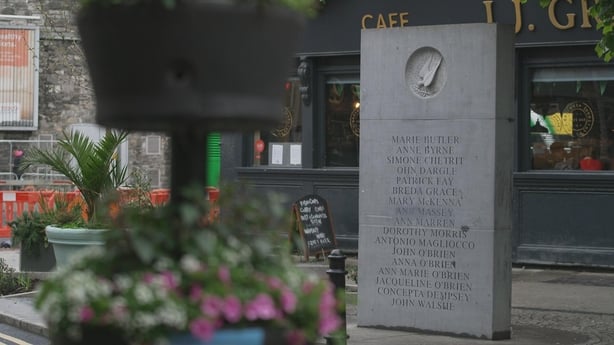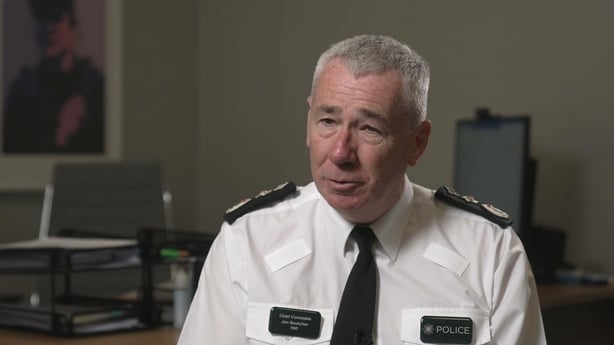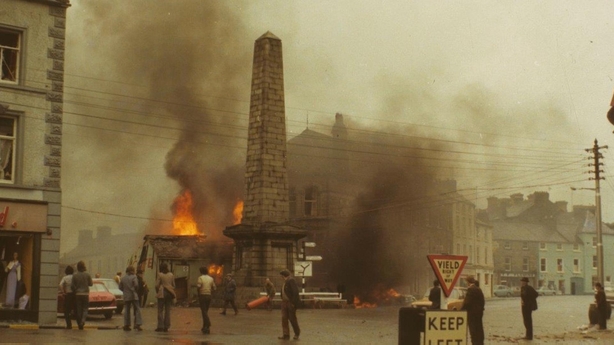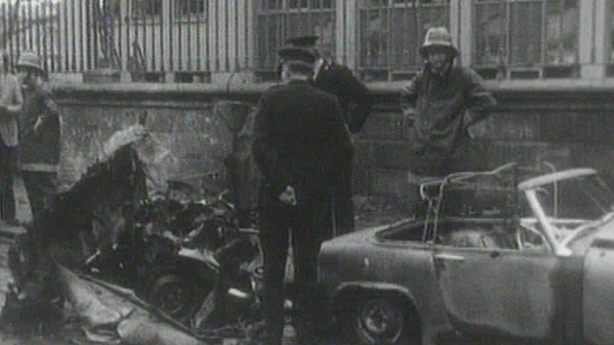The officer leading the inquiry into the activities of the loyalist gang suspected of being responsible for the Dublin and Monaghan bombings has said he has no doubt there was collusion between the gang and the British security services.
Iain Livingstone heads up Operation Denton, which is examining allegations relating to the activities of the so-called Glenanne Gang, which was based in Co Armagh and Mid-Ulster during the Troubles, including its role in the Dublin and Monaghan bombings.
"I can say categorically there was collusion. We know that to be true," Mr Livingstone told Prime Time as part of a report into the 1974 atrocity.
"What we are going to do - and we are going to do it with rigour, and we're going to do it with complete transparency - is define the character, the nature and the extent of that collusion," he said.
"It’s well established that people who worked for the State - police officers, members of the UDR - had previously been involved in some of these despicable, sectarian attacks that were carried out primarily by loyalist paramilitaries."
"Whether there were individuals within that who were also agents and in terms of informants - that’s something that our review will consider, we’ll make an assessment around that, and we will report on that because it’s a matter of legitimate public interest," he added.
Operation Denton is examining 127 killings linked to the Glenanne Gang. The deaths include the 34 people, including one unborn child, killed in the Dublin and Monaghan bombings.

The Glenanne Gang consisted of members of the UVF paramilitary group, the locally recruited British army regiment the UDR, and members of an RUC Special Patrol Group, whose duties included anti-terrorism.
A Prime Time report to be broadcast tonight focuses on allegations that the gang played a key role in the Dublin and Monaghan bombings, and asks why suspects identified within days were never charged in connection with the attacks.
In a four-minute period around 5.30pm on 17 May 1974, three explosions rocked Dublin's Parnell Street, Talbot Street and South Leinster Street. Another followed 90 minutes later in Monaghan town.
The death toll was the largest to occur in a single day during the Troubles. More than 250 other people were injured.
Friday marks the 50th anniversary of the bombings, but victims’ families are still searching for justice.
Separately, the Chief Constable of the Police Service of Northern Ireland (PSNI), Jon Boutcher, has told Prime Time he will not block efforts by the families of victims of the bombings to take legal action to gain access to related secret British government files.
His predecessor as Chief Constable, Simon Byrne, and the British Ministry of Defence, spent six years robustly opposing such a legal action by the families.
Before taking up the position as PSNI Chief Constable in November 2023, Jon Boutcher spent almost four years leading Operation Denton.
"I won't be opposing any progress of any civil case to be properly heard in the court, to ensure that the victims have that opportunity for that civil redress, which I think they've got every right to," he said.

The comments stand in contrast to steps previously taken by his predecessor and the British Ministry of Defence, which included trying to overturn a High Court ruling in Belfast in 2018 which directed the UK authorities to hand over relevant documents.
As recently as last month, a High Court judge in Belfast dismissed an application from the PSNI instigated during the leadership of the former chief constable, and British authorities, to have the families' case thrown out.
The statements from Mr Livingstone and Chief Constable Boutcher may offer new hope to relatives of victims of the bombings, who are still seeking justice for their loved-ones five decades later.
The attacks were viewed as a warning to the government in Dublin that political interference in the affairs of Northern Ireland would come at a heavy price.
They happened during a period of intense political volatility, when Northern Ireland was paralaysed by the Ulster Workers Council strike.
The strike was a protest against the Sunningdale Agreement which would have included a Council of Ireland, and given the Irish government a direct say in policies in Northern Ireland.
However, investigations into the bombings were quickly wound up without arrests. Details about the timeframes of the investigations were revealed in a 2003 report into the killings by Judge Henry Barron, and outraged victims’ families.

Margaret Urwin of Justice for the Forgotten, a campaign group which represents families, told Prime Time it is "absolutely incredible" that the Garda investigation into the Dublin bombings was closed down within two months, and the Monaghan investigation a month earlier.
Across the border, the RUC investigation was also wound up quickly, despite Special Branch having a list of suspects.
"I think by today's standards, we know that would never happen," PSNI Chief Constable Boutcher told Prime Time.
"Those enquiries would've gone on for a number of years. You know, every possible lead would have been exploited," he said.
"In the early 1970s, was that the norm for investigations of that nature? I actually think probably not," he added.

The Prime Time report also includes footage from an interview with a self-confessed Glenanne Gang member conducted during a BBC Northern Ireland investigation 20 years ago.
William McCaughey, a former RUC officer who died in 2006, admitted to being a member of the UVF and Glenanne Gang while also serving as a member of an RUC Special Patrol Group, whose duties included anti-terrorism.
McCaughey confirmed that the gang consisted of members of the UVF, UDR and police officers.
Additionally, a police officer who worked in the area where the Glenanne Gang operated in the 1970s told Prime Time they believe investigations into the activities of the group were mishandled or obstructed.
"The people that I worked with are honourable and professional police officers," serving PSNI Superintendent Gerry Murray said "but probably others within the organisation knew sufficiently more evidence that obviously wasn't shared with the people who were operationally policing on the ground."
Superintendent Murray worked as an RUC sergeant in south Armagh during the 1970s.
Operation Denton is due to report early next year.
50 years on from the attacks, families now hope the final report from Operation Denton will trigger a renewed push for justice.
"I’ve made one promise to my mother. I will, as long as I live, I will carry on with the campaign and to get justice for my father," Pat Fay told Prime Time. His father Patrick was killed while putting petrol into his car on Parnell Street.
"I will carry on to do what I promised my mother. I’ll see it to the end."
Vincent Kearney and Sallyanne Godson’s report on the Glenanne Gang and the Dublin and Monaghan bombings is broadcast on the 16 May edition of Prime Time at 9.35pm on RTÉ One television.






